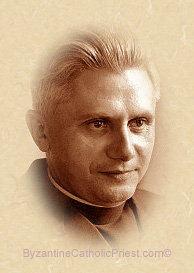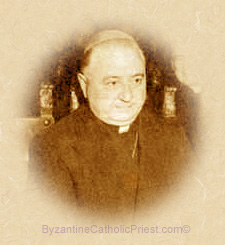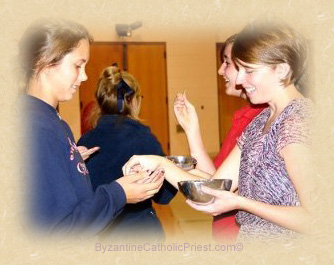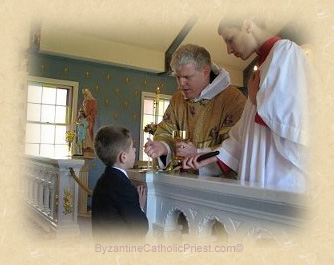My Balogna Has a First Name, It's E-R-R-O-R: the Histoical Context of Pope Benedict's "Reform of the Reform."
Return to ByzantineCatholicPriest.com. |
10:34 AM 3/5/2013 — Building upon the thoughts I shared with my parishioners in last Sunday's homily, “The Dogma of Sufficient Grace, Part Two, and the Martyrdom of Pope Benedict,” I feel it's necessary to provide some historical context which would have been out-of-place in a homily at the Divine Liturgy, regarding the reform of the Catholic Church inaugurated by our now Pope-Emeritus, and which is not merely something on the level of ideas, but is something very real and specific.
In his final message to the College of Cardinals, written just two days before his abdication took effect, Pope-Emeritus Benedict reminded them of the reform he initiated, and charged them with resisting the temptation to revert to the comfortable position of allowing the false Vatican II to continue to masquerade as the authentic Ecumenical Council. What many may not understand is that this battle—between the false council and the actual one which most Catholics know nothing about—is not some esoteric and ethereal concept, but is in fact a very real and specific problem.
As an Eastern Catholic, the "reform of the reform," as Pope Benedict liked to call it, is a mixed blessing, since the newest additions to the parish families of which I am pastor are all Roman Catholics looking for a sense of mystery and tradition which they can't find in the Latin Church. If the Latin Church were ever to finally get it's act together with regard to it's own rich tradition, that spigot of new blood will probably dry up. In fact, that effect has already taken place in a few cases: I had some students from a nearby university attending last year who have now disappeared because a parish nearer to them has decided to offer the Extraordinary Mass allowed by Pope Benedict. Darn it!
But I try to be philosophical about it, and to rejoice as best I can with my friends in the Latin Church who find great hope in the attempts of their newer and younger bishops to correct the errors of the past. In that process, there is growing sentiment that it wasn't really Vatican II that was the problem, but what happened right after it; a theme that Pope Benedict has touched on in several of his remarks, including his last intervention to the Sacred College. To sum it up, the basic idea is that the reform that took place after the Council was over was not, in fact, the reform that the Council Fathers had asked for. The Mass that was produced, known as the Novus Ordo, was not a product of Vatican II at all; it was composed after the Council was over by people who, themselves, were not even at the Council, and was described by the future Pope Benedict as "a manufactured product" completely devoid of any link to Catholic history.
 What is really happening is the latest—and one hopes the final—battle between two camps that arose after the Council: the authenticists, led by Cardinal Siri and, after his death, by Cardinal Ratzinger, and the "Bologna School," led by Fr. Giuseppe Dossetti and professor Giuseppe Alberigo, founders of the Bologna Institute which produced the most widely read history of the Council, a massive five volume work called "The History of Vatican II," which appeared almost immediately after the Council, but which was only just completed in 2001. What is really happening is the latest—and one hopes the final—battle between two camps that arose after the Council: the authenticists, led by Cardinal Siri and, after his death, by Cardinal Ratzinger, and the "Bologna School," led by Fr. Giuseppe Dossetti and professor Giuseppe Alberigo, founders of the Bologna Institute which produced the most widely read history of the Council, a massive five volume work called "The History of Vatican II," which appeared almost immediately after the Council, but which was only just completed in 2001.
Giuseppe Card. Siri was Archbishop of Genoa during the Council, and Father Joseph Ratzinger—later Pope Benedict XVI—was a professor of Theology in Munich who served as a peritis or "consulting theologian" to the Council Fathers. Both argued strenuously for a reform which built upon the past. Unfortunately, they didn't write a book, which gave the "Bologna-ites" a larger audience. The Bologna School argued that what the Council really did was completely reinvent the Catholic religion, so much so that even the documents of Vatican II themselves could be ignored. What was important about Vatican II, they argued, was not what was actually contained in the final documents, but the "spirit of Vatican II."  They then set out to define what the "spirit of Vatican II" was; and it turned out to have nothing to do with what the Council Fathers actually said. So, for example, where Vatican II said that the vernacular language could be allowed by the local bishop in certain controlled situations, the Bologna School said that what the Council really meant was that any Mass in any language not understood by the people was not a valid form of worship. Where the Council said that religious institutes should return to an authentic interpretation of the spirituality of their founders, Bologna said that nuns should get out of those nasty habits and out of those schools and hospitals and start doing social work. Where the Council said that all Christians should recognize the priesthood of the faithful and collaborate with their priests in the evangelization of the world around them, Bologna blurred the line between clergy and laity, and spoke of the priesthood as a "role" rather than a sacrament. Where the Council said that our discussions with non-Catholics should begin by recognizing what we have in common with our separated brethren, Bologna said that all religions were now of equal merit and it was wrong to try to convert anyone. They then set out to define what the "spirit of Vatican II" was; and it turned out to have nothing to do with what the Council Fathers actually said. So, for example, where Vatican II said that the vernacular language could be allowed by the local bishop in certain controlled situations, the Bologna School said that what the Council really meant was that any Mass in any language not understood by the people was not a valid form of worship. Where the Council said that religious institutes should return to an authentic interpretation of the spirituality of their founders, Bologna said that nuns should get out of those nasty habits and out of those schools and hospitals and start doing social work. Where the Council said that all Christians should recognize the priesthood of the faithful and collaborate with their priests in the evangelization of the world around them, Bologna blurred the line between clergy and laity, and spoke of the priesthood as a "role" rather than a sacrament. Where the Council said that our discussions with non-Catholics should begin by recognizing what we have in common with our separated brethren, Bologna said that all religions were now of equal merit and it was wrong to try to convert anyone.
 The Bologna Institute's approach was a gold mine for liberals who thought the Council just didn't go far enough. It gave them the ammunition they needed to begin the wholesale destruction of the Catholic religion with which most people were familiar. The Institute's book, "The History of Vatican II," began to replace the Council documents themselves in seminaries all over the world; and, it was protégés of the Institute, under the guidance of Archbishop Annibale Bugnini, Bologna's most famous son, who wrote the Novus Ordo. Paul VI, who was pope at the time, clearly considered the Bologna book to be the gospel. The Bologna Institute's approach was a gold mine for liberals who thought the Council just didn't go far enough. It gave them the ammunition they needed to begin the wholesale destruction of the Catholic religion with which most people were familiar. The Institute's book, "The History of Vatican II," began to replace the Council documents themselves in seminaries all over the world; and, it was protégés of the Institute, under the guidance of Archbishop Annibale Bugnini, Bologna's most famous son, who wrote the Novus Ordo. Paul VI, who was pope at the time, clearly considered the Bologna book to be the gospel.
The election of Joseph Ratzinger as Pope became the first hurdle in the Bologna School's attempt to hijack the Council, a hijacking that everyone in Bologna thought was a done deal; and, perhaps spurred on by the Holy Father's own occasional statements and actions, bishops all over the world are now beginning to poke their heads out of their foxholes, and new bishops are being appointed who are willing to take on Bologna head on.
People hear what they want to hear, and their historical perspective often goes no farther back than the day of their birth. When Pope Benedict promulgated Summorum Pontificum, mandating unrestricted access to the Missal of John XXIII (which was a minor reform of the Missal of St. Pius V), most people glossed over one of the most essential ideas in it: that the “Old Latin Mass,” as some refer to it, was never actually forbidden.  The notions that Vatican II required Mass in the vernacular, that the priest now had to face the people, that “Eucharistic Ministers,” Communion in the hand and guitars all came out of Vatican II, etc., are nothing more than examples of the extent that the pseudo-council has replaced the true Council in the minds of both clergy and laity alike. For some priests, in fact, challenging these purely cosmetic innovations that arose in the post-conciliar reform is akin to challenging their religion. For them, the “old ways” constitute a kind of regression to a false Christianity which views the sacraments as magic, and which championed a “cultic” rather than “relational” view of Liturgy and the sacraments, reflecting the action of the Holy Spirit correcting centuries of error. Whereas we used to believe that Baptism was the cleansing of Original sin and the restoration of Sanctifying Grace, now we recognize it as a welcoming into the community of faith; whereas we used to regard marriage as the ratification of a covenant between God and man and an icon of Christ's love for His Church, sanctifying the act of procreation, now we recognize it as a celebration of love on a purely human level; whereas we used to regard confession as a vehicle for receiving the absolution from our sins, now we understand it as a kind of religious therapy to help us get in touch with the roots of our unhappiness; The notions that Vatican II required Mass in the vernacular, that the priest now had to face the people, that “Eucharistic Ministers,” Communion in the hand and guitars all came out of Vatican II, etc., are nothing more than examples of the extent that the pseudo-council has replaced the true Council in the minds of both clergy and laity alike. For some priests, in fact, challenging these purely cosmetic innovations that arose in the post-conciliar reform is akin to challenging their religion. For them, the “old ways” constitute a kind of regression to a false Christianity which views the sacraments as magic, and which championed a “cultic” rather than “relational” view of Liturgy and the sacraments, reflecting the action of the Holy Spirit correcting centuries of error. Whereas we used to believe that Baptism was the cleansing of Original sin and the restoration of Sanctifying Grace, now we recognize it as a welcoming into the community of faith; whereas we used to regard marriage as the ratification of a covenant between God and man and an icon of Christ's love for His Church, sanctifying the act of procreation, now we recognize it as a celebration of love on a purely human level; whereas we used to regard confession as a vehicle for receiving the absolution from our sins, now we understand it as a kind of religious therapy to help us get in touch with the roots of our unhappiness;  whereas Holy Orders was the conferral of an indelible character on the soul which empowered a man to act on behalf of and with the power of Christ to rule, teach and sanctify, now we know it to be a calling forth from the community to fulfill the role of leadership and enabling; whereas a funeral used to be a petition to Almighty God to be merciful and to speed the soul on its journey, now it is little more than a kind of liturgical grief counseling for the bereaved, in which everyone is already in heaven and has no need of a purgation because there really is no such thing as sin; whereas we used to understand that the role of the laity was to spread the Gospel of Jesus Christ throughout the secular world, we now know “Lay Apostolate” was wrong, and “Lay Ministry” is where it's at, so we don't waste time sanctifying the world around us and raising children in the faith, but spend our time planning liturgies and giving out Holy Communion like lolly pops at hospitals to anyone and everyone who's listed as “Catholic” on their admission card, regardless of whether he's been to confession in the last twenty years (“Oh, you're a Catholic? Well, here, eat this”); whereas we used to regard full participation in the Mysteries of the Church in terms of prayer and mystical union with Christ, now we know that participation means doing the readings and distributing Communion—and how many Catholics have you met who actually believe that the purpose of what they incorrectly call “Eucharistic Ministers” is to foster lay participation? How many parishes have it for that reason, and not because they actually need it? All of this is the fruit of a phony council that never took place, invented by the enemies of Christ who emerged after it was over, and hijacked it. whereas Holy Orders was the conferral of an indelible character on the soul which empowered a man to act on behalf of and with the power of Christ to rule, teach and sanctify, now we know it to be a calling forth from the community to fulfill the role of leadership and enabling; whereas a funeral used to be a petition to Almighty God to be merciful and to speed the soul on its journey, now it is little more than a kind of liturgical grief counseling for the bereaved, in which everyone is already in heaven and has no need of a purgation because there really is no such thing as sin; whereas we used to understand that the role of the laity was to spread the Gospel of Jesus Christ throughout the secular world, we now know “Lay Apostolate” was wrong, and “Lay Ministry” is where it's at, so we don't waste time sanctifying the world around us and raising children in the faith, but spend our time planning liturgies and giving out Holy Communion like lolly pops at hospitals to anyone and everyone who's listed as “Catholic” on their admission card, regardless of whether he's been to confession in the last twenty years (“Oh, you're a Catholic? Well, here, eat this”); whereas we used to regard full participation in the Mysteries of the Church in terms of prayer and mystical union with Christ, now we know that participation means doing the readings and distributing Communion—and how many Catholics have you met who actually believe that the purpose of what they incorrectly call “Eucharistic Ministers” is to foster lay participation? How many parishes have it for that reason, and not because they actually need it? All of this is the fruit of a phony council that never took place, invented by the enemies of Christ who emerged after it was over, and hijacked it.
As I mentioned in my homily last Sunday, Pope Benedict resigned because he didn't want to see this necessary reform—implementing the true Council for the first time—grind to a halt along with his rapidly declining health. He sacrificed himself to allow the reform to continue in the hands of a healthier man, knowing full well that the Council's enemies are still out there, hoping to hijack it again. It's a risky move to be sure, as no one knows who the next Pope will be; but, the Pope-Emeritus has retreated into prayer in his last days to beg God to see that the reform continues; and, I have ample confidence that, between his prayers and sacrifices, and the action of the Holy Spirit which will manipulate the conclave to Divine ends, the enemies of Christ will be confounded once again.

|

